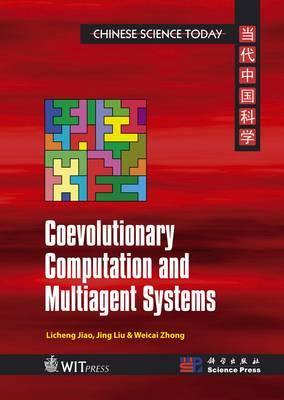Overview
The origins of evolutionary computation can be traced back to the late 1950s where it remained, almost unknown, to the broader scientific community for three decades until the 1980s when it started to receive significant attention, as did the study of multi-agent systems (MAS). This focuses on systems in which many intelligent agents interact with each other. Today these systems are not simply a research topic but are also beginning to become an important subject of academic teaching and industrial and commercial application. Co-evolutionary Algorithm & Multi-agent Systems introduces the author's recent work in these two new and important branches of artificial intelligence.
Full Product Details
Author: Licheng Jiao ,
J. Liu ,
Wan-Xie Zhong (Dept. of Engineering Mechanics, Dalian University of Technology, PR of China)
Publisher: WIT Press
Imprint: WIT Press
ISBN: 9781845646387
ISBN 10: 184564638
Pages: 270
Publication Date: 16 December 2011
Audience:
College/higher education
,
Postgraduate, Research & Scholarly
Format: Hardback
Publisher's Status: Active
Availability: In Print

This item will be ordered in for you from one of our suppliers. Upon receipt, we will promptly dispatch it out to you. For in store availability, please contact us.
Author Information
Licheng JIAO (Ph.D. Xi'an Jiaotong University, 1990) has been a full professor in the School of Electronic Engineering at Xidian University since 1992, having been a postdoctoral fellow in the National Key Laboratory for Radar Signal Processing, Xidian University, Xi'an, China, from 1990 to 1991. Currently, he is the Dean of the Electronic Engineering School and the Director of the Key Lab of Intelligent Perception and Image Understanding of Ministry of Education of China at Xidian University. In 1992, Dr. Jiao was awarded the Youth Science and Technology Award. In 1996, he was granted the Cross-Century Specialists Fund from the Ministry of Education of China, and also selected as a member of the First Level of Millions of Talents Project of China. In 2006, he was selected as an Expert with Special Contribution to Shaanxi Province. In 2007, as a principal member, he and his colleagues founded an Innovative Research Team of the Ministry of Education of China. Dr. Jiao is a Senior Member of IEEE, a member of IEEE Xi'an Section Execution Committee, the Chairman of Awards and Recognition Committee, vice board chairperson of Chinese Association of Artificial Intelligence, councilor of Chinese Institute of Electronics, committee member of Chinese Committee of Neural Networks, and expert of Academic Degrees Committee of the State Council. His research interests include image processing, natural computation, machine learning, and intelligent information processing. He has been the principle investigator of over 40 important scientific research projects, published more than 20 monographs, and a hundred of papers in international journals and conferences. Jing LIU (Ph.D., Institute of Intelligent Information Processing, Xidian University, 2004, circuits and systems) joined Xidian University in 2005 as a lecturer, and was promoted to a full professor in 2009. From 2007 to 2008, she worked in The University of Queensland, Australia as a postdoctoral research fellow, and from 2009 to 2011, she worked in University of New South Wales as a research associate with the Australian Defence Force Academy. Her research interests include evolutionary computation, complex networks, multiagent systems, and data mining. She has co-authored 2 monographs and more than 40 research papers which were published by international journals and conferences. Weicai ZHONG (Ph.D., Institute of Intelligent Information Processing, Xidian University, 2004, pattern recognition and intelligent information systems) is also with Xidian University. He worked at SPSS Inc. (Xi'an, China) as a Senior Statistician from 2005 to 2007. In 2008, he worked at the University of Ottawa, Canada, as a postdoctoral research fellow, and from 2009 to 2010, he worked at the University of New South Wales as a research associate with the Australian Defence Force Academy. His research interests include evolutionary game, complex networks, evolutionary computation, and statistical learning. He has co-authored one monograph and more than 30 research papers published by international journals and conferences.




